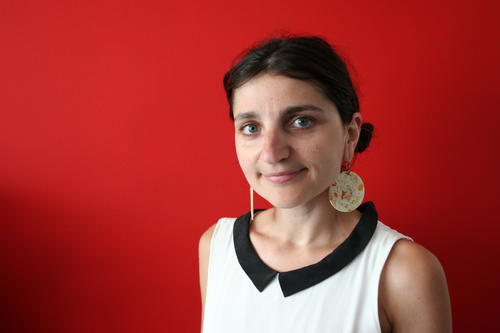Focusing on Issues of Gender and Health
Irina Catrinel Crăciun holds the international visiting professorship for gender studies at Freie Universität this semester.
Feb 18, 2016
Health psychologist Irina Catrinel Crăciun specializes in age and gender studies.
Image Credit: Privat
How do unemployed men and women deal with aging? Why do women in Romania know so little about hepatitis? Irina Catrinel Crăciun’s research projects focus closely on the lived experiences of many people.
A native of Romania and an expert on health psychology, she has been doing research and teaching at the Qualitative Social and Education Research division at Freie Universität since October 2015 as part of the Dahlem International Network Professorship for Gender Studies, a visiting professorship. Following in the footsteps of Canadian political scientist Verónica Schild and Iranian archaeologist Leila Papoli Yazdi, Crăciun is now putting her own stamp on the professorship.
In Romania, gender studies is still a very new field, she says – unlike in Germany. “The interconnectedness in Germany, and at Freie Universität, in this area is outstanding. It’s great to get to know scholars from a wide range of different areas who view the subject from different perspectives at conferences. The interdisciplinary dialogue with scholars of literature and theatre, with medical researchers and sociologists, all of whom are studying the subjects of age and gender in one form or another, is really exciting,” Crăciun says.
She studied, taught, and did research at Babes-Bolyai University, in Cluj-Napoca, Romania. Areas of emphasis in her research include health communication, health in advancing age, and the development and evaluation of prevention programs with a focus on gender-specific differences. Crăciun was already familiar with Freie Universität: From 2007 through 2010, she was a doctoral candidate in health psychology here, and she returned from 2012 through 2014 for the “Resources for Positive Aging” research project, which was supported by the Alexander von Humboldt Foundation.
The Challenge of Teaching in German
Crăciun is delighted to have been given the international visiting professorship in gender studies at Freie Universität. She says that even though it only runs for one semester, it is still a huge opportunity in two ways: First, it is a great way for foreign scholars and scientists to get to know the German university system in general, and second, it is an excellent opportunity for Crăciun personally, since the field of gender studies is much more advanced in Germany than it is in Romania. “The fact that I was already familiar with Freie Universität and didn’t need a long time to settle in was a big advantage,” she says. “The biggest challenge for me was teaching in German,” Crăciun adds. As part of the visiting professorship, she teaches several courses, including an introduction to qualitative research, which focuses on age and gender studies.
Crăciun began specializing in these disciplines after earning her doctorate and going to work at Babes-Bolyai University. “I was very lucky in that my boss implemented several projects with the World Health Organization (WHO) and UNICEF, especially on the subjects of violence against women and health and sexuality among women and men. It piqued my interest, and I definitely wanted to do more research on these topics.”
Research on Romanian Migrants in Germany
Crăciun is currently working on two research projects headed by Professor Uwe Flick of the Qualitative Social and Education Research division at Freie Universität. “I am thrilled to have the opportunity to do research there,” she says. As part of the “Migration – Living Environment – Unemployment” (MILEA) project, she is studying the perspectives of unemployed migrants of both sexes from Turkey and Russia regarding aging and health in advancing age. The project also looks at coping mechanisms, meaning how people – especially older individuals – deal with unemployment, and whether there are differences between men and women in this respect.
As part of the “Palliative Quality of Life – Service Utilization by Migrants from Russian-Speaking Countries” (PALQUALSUM) project, Crăciun is studying the experiences of people who take care of severely ill family members until their death, examining whether there may be differences in how men and women deal with death and dying.
Crăciun is currently planning a research project on hepatitis prevention. The project will focus on how to improve health knowledge among pregnant Romanian migrants in Germany so that they can protect themselves from the disease. “Romania is the country with the highest prevalence of hepatitis in Europe,” Crăciun says. It is known from other health psychology studies that the Romanian population hardly makes use of any preventive measures at all, and that people generally do not talk much about the disease. “There is still a lot to be studied in this field,” Crăciun says. If the project, which is slated to run for three years, receives funding, work could start this April – and Crăciun could continue her research at Freie Universität.
Further Information
Gender equality and support for gender studies has been an integral part of Freie Universität’s self-image for more than three decades, which is also why it is a key element of the institutional strategy with which the university was once again successful in the Excellence Initiative organized by the German federal and state governments in 2012. The Dahlem International Network Professorship for Gender Studies, which was established in the 2013/2014 winter semester, supports activities to strengthen the international focus of gender studies at Freie Universität. It is awarded annually to one outstanding scholar or scientist in this field.
Contact
- Dr. Nina Diezemann, Office of News and Public Affairs, Freie Universität Berlin, Tel. +49 30 838-73190, Email: nina.diezemann@fu-berlin.de

